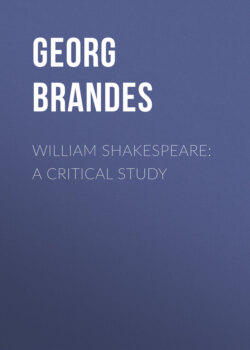Читать книгу William Shakespeare: A Critical Study - Георг Брандес - Страница 8
На сайте Литреса книга снята с продажи.
V POLITICAL AND RELIGIOUS CONDITIONS—ENGLAND'S GROWING GREATNESS
ОглавлениеThe period of Shakespeare's arrival in London was momentous both in politics and religion. It is the period of England's development into a great Protestant power. Under Bloody Mary, the wife of Philip II. of Spain, the government had been Spanish-Catholic; the persecutions directed against heresy brought many victims, and among them some of the most distinguished men in England, to the scaffold, and even to the stake. Spain made a cat's-paw of England in her contest with France, and reaped all the benefit of the alliance, while England paid the penalty. Calais, her last foothold on the Continent, was lost.
With Elizabeth, Protestantism ascended the throne and became a power in the world. She rejected Philip's courtship; she knew how unpopular the Spanish marriage had made her sister. In the struggle with the Papal power she had the Parliament on her side. Parliament had at once recognised her as Queen by the law of God and the country, whilst the Pope, on her accession, denied her right to the throne. The Catholic world took his part against her; first France, then Spain. England supported Protestant Scotland against its Catholic Queen and her Scottish-French army, and the Reformation triumphed in Scotland. Afterwards, when Mary Stuart had ceased to rule over Scotland and taken refuge in England, in the hope of there finding help, it was no longer France but Philip of Spain who stood by her. He saw his despotism in the Netherlands threatened by the victory of Protestantism in England.
Political interest led Elizabeth's Government to throw Mary into prison. The Pope excommunicated Elizabeth, absolved her subjects from their oath of allegiance, and declared her a usurper in her own kingdom. Whoever should obey her commands was excommunicated along with her, and for twenty years on end one Catholic conspiracy against Elizabeth treads on another's heels, Mary Stuart being involved in almost all of them.
In 1585 Elizabeth opened the war with Spain by sending her fleet to the Netherlands, with her favourite, Leicester, in command of the troops. In the beginning of the following year, Francis Drake, who in 1577-80 had for the first time circumnavigated the world, surprised and took San Domingo and Carthagena. The ship in which he had achieved his great voyage lay at anchor in the Thames as a memorial of the feat; it was often visited by Londoners, and no doubt by Shakespeare among them.
In the years immediately following, the springtide of the national spirit burst into full bloom. Let us try to picture to ourselves the impression it must have made upon Shakespeare in the year 1587. On the 8th of February 1587 Mary Stuart was executed at Fotheringay, and the breach between England and the Catholic world was thus made irreparable. On the 16th of February, England's noblest knight and the flower of her chivalry, Sir Philip Sidney, the hero of Zutphen, and the chief of the Anglo-Italian school of poets, was buried in St. Paul's Cathedral, with a pomp which gave to the event the character of a national solemnity. Sidney was an ideal representative of the aristocracy of the day. He possessed the widest humanistic culture, had studied Aristotle and Plato no less than geometry and astronomy, had travelled and seen the world, had read and thought and written, and was not only a scholar but a soldier to boot. As a cavalry officer he had saved the English army at Gravelines, and he had been the friend and patron of Giordano Bruno, the freest thinker of his time. The Queen herself was present at his funeral, and so, no doubt, was Shakespeare.
In the following year Spain fitted out her great Armada and despatched it against England. As regards the size of the ships and the number of the troops they carried, it was the largest fleet that had ever been seen in European waters. And in the Netherlands, at Antwerp and Dunkerque, transports were in readiness for the conveyance of a second vast army to complete the destruction of England. But England was equal to the occasion. Elizabeth's Government demanded fifteen ships of the city of London; it fitted out thirty, besides raising a land force of 30,000 men and lending the Government £52,000 in ready money.
The Spanish fleet numbered one hundred and thirty huge galleons, the English only sixty sail, of lighter and less cumbrous build. The young English noblemen competed for the privilege of serving in it. The great Armada was ill designed for defying wind and weather in the English Channel. It manœuvred awkwardly, and, in the first encounters, proved itself powerless against the lighter ships of the English. A couple of fire-ships were sufficient to throw it into disorder; a season of storms set in, and the greater number of its galleons were swept to destruction.
The greatest Power in the world of that day had broken down in its attempt to crush the growing might of England, and the whole nation revelled in the exultant sense of victory.
